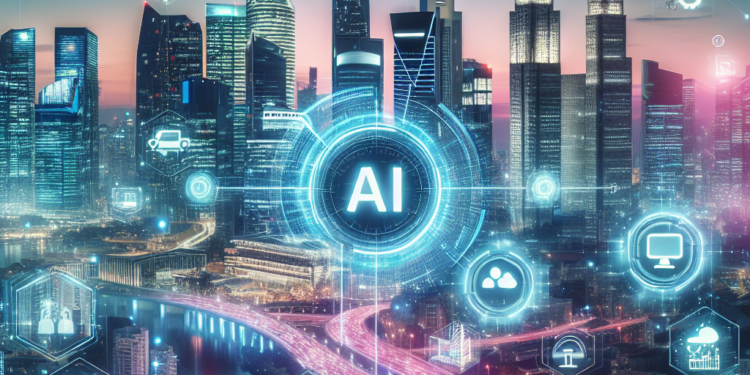Smart Cities: AI Case Studies and Lessons
In today’s fast-paced world, the concept of smart cities has gained significant traction as urban areas look for innovative ways to improve efficiency, sustainability, and quality of life for their residents. One key component of smart cities is the integration of artificial intelligence (AI) technology to help streamline processes, enhance decision-making, and optimize resource allocation.
AI has the potential to revolutionize how cities operate by analyzing vast amounts of data in real-time, predicting future trends, and automating various tasks. With the help of AI, cities can become more responsive, efficient, and environmentally friendly in a way that was never before possible.
In this article, we will explore some case studies of smart cities that have successfully implemented AI technologies and the lessons that can be learned from their experiences.
1. Singapore
Singapore is often touted as one of the leading examples of a smart city, thanks in large part to its extensive use of AI. The city-state has leveraged AI to improve traffic management, waste management, public safety, and healthcare.
One notable example is the use of AI-powered cameras to monitor traffic conditions in real-time and adjust traffic signals accordingly. This has helped reduce congestion, cut down on travel times, and minimize emissions from idling vehicles.
Singapore has also implemented AI algorithms to optimize waste collection routes, leading to more efficient garbage pickup and reduced fuel consumption. In addition, the city has used AI to analyze public safety data and predict potential crime hotspots, allowing law enforcement to allocate resources more effectively.
Lessons Learned: Singapore’s success in implementing AI technologies can be attributed to its strong government support, infrastructure investment, and emphasis on data privacy and security. The city has also prioritized public-private partnerships to foster innovation and collaboration in the smart city space.
2. Barcelona
Barcelona is another city that has embraced AI to enhance its urban environment. The city has implemented smart sensors and AI algorithms to monitor air quality, reduce energy consumption, and optimize water usage.
One notable project is the use of smart lighting systems that automatically adjust brightness levels based on ambient light conditions and pedestrian traffic. This has helped reduce energy consumption and light pollution, while improving safety and visibility in public spaces.
Barcelona has also implemented AI-driven irrigation systems in its parks and green spaces to optimize water usage and preserve the city’s natural resources. By analyzing weather data and soil moisture levels, these systems can automatically adjust watering schedules to ensure plants receive the right amount of water.
Lessons Learned: Barcelona’s success in implementing AI technologies is due in part to its strong focus on sustainability and environmental stewardship. The city has also prioritized citizen engagement and transparency, involving residents in the decision-making process and ensuring that AI technologies are used ethically and responsibly.
3. Tokyo
Tokyo is another city that has embraced AI to improve the quality of life for its residents. The city has implemented AI-driven healthcare systems to analyze patient data, predict disease outbreaks, and improve treatment outcomes.
One notable project is the use of AI algorithms to analyze medical imaging scans and detect early signs of diseases such as cancer. By automating the analysis process, doctors can quickly diagnose patients and prescribe appropriate treatments, leading to better patient outcomes and reduced healthcare costs.
Tokyo has also implemented AI-powered chatbots to provide personalized health advice and support to residents. These chatbots can answer questions, schedule appointments, and provide real-time updates on health-related issues, helping residents stay informed and empowered to take control of their own health.
Lessons Learned: Tokyo’s success in implementing AI technologies can be attributed to its strong emphasis on innovation, research, and collaboration with leading academic institutions and technology companies. The city has also prioritized data privacy and security, ensuring that AI technologies comply with strict regulations and ethical guidelines.
4. Dubai
Dubai is a city that is known for its ambitious smart city initiatives and aggressive use of AI technologies. The city has implemented AI-powered drones to monitor traffic conditions, conduct inspections, and assist law enforcement in public safety efforts.
One notable project is the use of AI-driven drones to inspect construction sites and infrastructure projects, detecting potential safety hazards and ensuring compliance with building codes. This has helped reduce the risk of accidents and improve the quality of construction in the city.
Dubai has also implemented AI algorithms to analyze data from smart meters and sensors to optimize energy consumption and reduce waste. By identifying patterns and trends in energy usage, the city can adjust heating, cooling, and lighting systems to minimize energy costs and environmental impact.
Lessons Learned: Dubai’s success in implementing AI technologies can be attributed to its visionary leadership, strong investment in infrastructure, and commitment to innovation and entrepreneurship. The city has also prioritized public-private partnerships and international collaboration to attract talent, resources, and expertise to help drive its smart city initiatives forward.
Conclusion
As cities around the world continue to grow and face complex challenges, the integration of AI technologies holds great promise for improving efficiency, sustainability, and quality of life for residents. By learning from the case studies of smart cities that have successfully implemented AI, we can glean valuable insights and lessons on how to leverage technology to build more responsive, resilient, and inclusive urban environments.
Key takeaways include the importance of government support, infrastructure investment, public-private partnerships, sustainability, citizen engagement, data privacy, and innovation in driving the success of smart city initiatives. By prioritizing these key factors and learning from the experiences of pioneering cities, we can accelerate the adoption of AI technologies and pave the way for a more intelligent, connected, and prosperous future for cities around the world.













